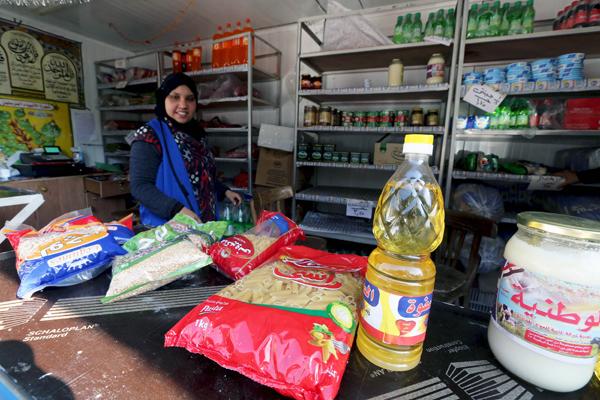You are here
Egypt's sugar shortage a window on economic policy confusion
By Reuters - Nov 02,2016 - Last updated at Nov 02,2016

Locals gather to buy subsidised sugar from a government truck after a sugar shortage in retail stores across the country in Cairo, Egypt, October 14 (Reutes photo)
CAIRO/ABU DHABI — Cairo grocer Bakr Atef has stopped selling sugar since authorities seized his stocks last month, accusing him of hoarding as a growing economic crisis angers Egyptians and raises fears of street protests.
"They are coming and taking any quantity they find. Even if you are selling just 10 kilos, they'll take it... if they do this again and I lose my goods, it will shut my shop," said Atef, who insists he has done nothing wrong.
Egyptians love sugar, heaping large spoonfuls into their cups of tea. It is sold in government supermarkets as part of a massive food aid programme for the poor.
But public uproar over sugar shortages has prompted the government to sweep the country, confiscating supplies from businesses it accuses of hoarding.
Sugar is the latest vital commodity to be thrown into crisis in Egypt this year. A row over regulations left the world's biggest wheat importing nation unable to obtain the supplies it needed on the global market, while a dispute over prices caused a shortage of rice despite a bumper crop.
The sugar crisis raises questions about President Abdel Fattah Al Sisi's management of the economy just as his government seeks to secure a $12 billion loan from the IMF.
More austerity is expected as a condition for the loan, on top of tax and price increases, raising fears of a repeat of the street protests that drove two of Sisi's predecessors from office. A currency crisis has cut imports and caused large areas of business to seize up.
The sugar raids came to a head when authorities briefly seized 2,000 tonnes at confectionery maker Edita, one of the largest companies listed on the Egyptian stock exchange.
But while a shortage of dollars has reduced imports generally, traders and grocers say the sugar crisis was self-inflicted — the direct result of the state's takeover of their sugar reserves and distribution network earlier this year.
Traders say that despite ample supplies in its warehouses the government is simply not getting the sugar out to the stores where ordinary Egyptians can buy it.
"The government suspects the traders of hoarding but it is actually the government that is hoarding the stocks," a Middle East sugar trader told Reuters.
Egypt consumes 3 million tonnes of sugar a year but produces just over 2 million tonnes, with the gap filled by government and private imports usually purchased between July and October.
Traders say the crisis began in August, when the supply ministry raided sugar factories nationwide and seized 250,000 tonnes — most of the reserves held by the private sector — to secure supplies for its subsidised food outlets after failing to procure its usual shipments on time.
That coincided with high prices on the international sugar market while a rapid fall in the Egyptian pound and a 20 percent import tariff to protect local producers discouraged private importers from buying in the usual quantities.
With private sector imports low and stocks under government control, prices shot up, shelves went bare, and talk of a crisis dominated local media ahead of calls for a protest on November 11 over deteriorating economic conditions.
Speaking in parliament this week, Supply Minister Mohamed Ali Meselhy said the government had responded to the crisis by increasing the amount of sugar sold at its outlets to 240,000 tonnes in October from 70,000 normally.
But merchants say this is not enough, because the government is not releasing the sugar it seized from the private sector in August and is stepping up its confiscatory raids.
Atef, the Cairo grocer, had just 350 kilogrammes at his supermarket when government inspectors took it all away.
When he produced receipts showing his sugar was obtained legally, prosecutors told him the goods would not be returned but he would be reimbursed at half the price he had paid.
Fearing further raids, merchants and retailers like Atef are no longer buying sugar, which makes the supply squeeze worse.
Frozen supply chain
Atef is at the tail end of a sugar supply chain that traders say has been badly disrupted by the intervention of a government keen to show it is protecting consumers from exploitation by self-serving merchants.
Though the government has now ramped up its own imports — buying 250,000 tonnes to meet demand for sugar sold at government outlets — the supplies seized from the private sector remain in its hands.
The supply ministry has taken on a new role controlling the sugar distribution network, allocating stocks to food producers, supermarkets, and outlets across the country, and cutting out private sector distributors.
Traders say the new system is highly inefficient and has caused more shortages.
"It's as if you are selling bottled water to all of Egypt from one warehouse — how will it go to Siwa and Aswan and Luxor?" an Egypt-based sugar trader said.
"Before there were distribution channels that functioned very well, but now the government is doing it, and it's a complete failure."
The supply ministry has blamed smuggling for the continuing shortage. It raised the price of sugar at its outlets to 7 pounds from 5 pounds per kilo to counter such activity.
The ministry has meanwhile dispatched inspectors to seize sugar it says has leaked from subsidised outlets and been re-sold at a mark-up, leaving the private market wary that any remaining stocks will be seized.
The government pressure comes despite Egypt enjoying overall stocks of about 650,000 tonnes, the second sugar trader said, or nearly enough to satisfy both private and public sector needs until the local harvest in February.
"There is enough sugar in government stocks ... enough to resolve the crisis," said Ahmed Wakil, head of one of the country's largest commodity supply companies, who has urged the government to release all seized stocks.
"But the current distribution system is creating the problem. If they return to the old distribution channels, this will be resolved."
Related Articles
CAIRO — Borrowing a cup of sugar from your neighbour has rarely been so contentious in Egypt.At supermarkets across the country sugar has al
CAIRO — "Any rice?" says the woman, leaning into a shop in Cairo and brandishing a green smartcard that carries her family's food credits.
Egypt has watered down a tax on stock market gains it announced last week as part of efforts to trim a high budget deficit, after the country's bourse recorded its biggest daily drop in almost a year on Sunday.
















